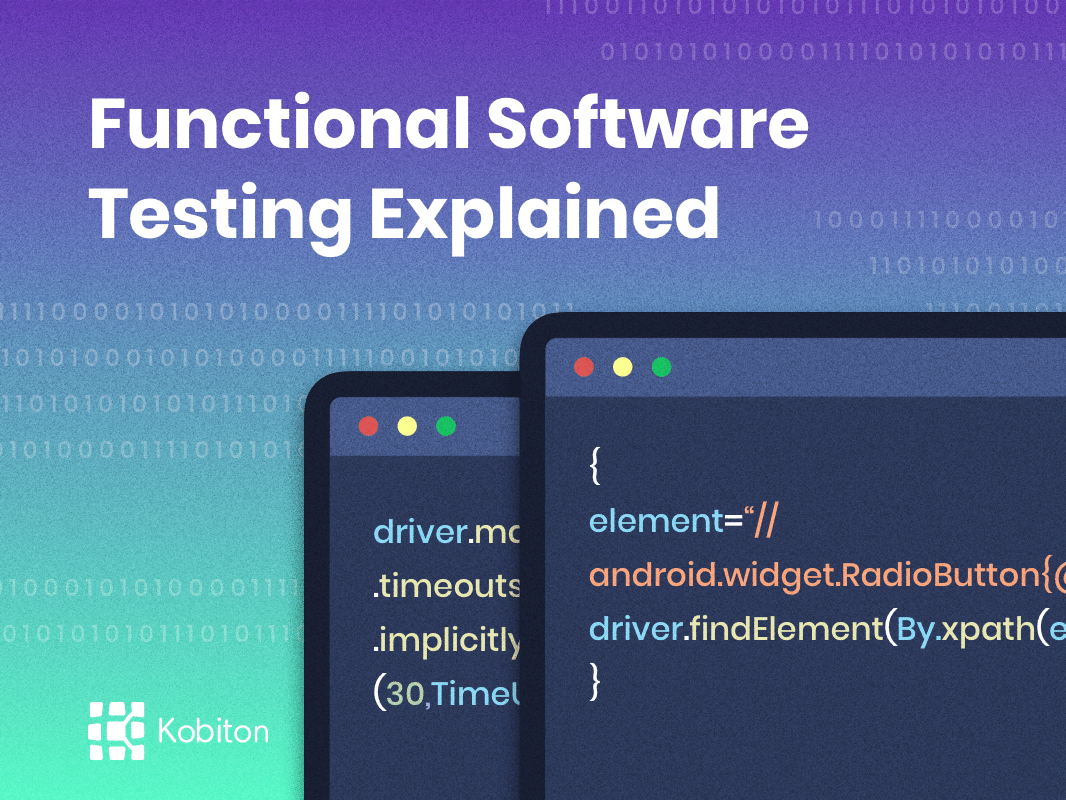
Functional Software Testing Explained

Adam Creamer
Software testing verifies the software to ensure it meets its requirements. It is an essential part of software development, as it helps identify and correct software errors before it is released to the end user.
There are different software testing life cycle phases, each serving a specific purpose. This blog will explore each step of the software testing life cycle and how Kobiton’s products and services can help you streamline your testing process.
The first phase of the software testing life cycle is requirements gathering, during which you identify and document the requirements for your application. The most important part of this testing cycle stage is communicating with stakeholders to understand the project’s goals and define what should be tested.
You may also need to perform competitive analysis or research similar products or features that already exist on the market. One of the critical tools that you can use to streamline requirements gathering is Kobiton’s mobile testing platform, which provides a centralized repository for all your test cases and builds information.
Once you have gathered your requirements, the next software testing life cycle phase is to create a test plan. This stage includes defining what types of testing you will perform, creating and prioritizing your test cases, and estimating the time and resources required for testing.
Kobiton’s mobile device lab provides access to over 1,000 real devices and emulators in 5 different locations worldwide to assist with this process. You can easily manage your test scenarios from a single dashboard, allowing you to focus on planning rather than managing device inventory.
In this testing cycle phase, testers work on developing test cases for each requirement to analyze and determine whether or not the product meets quality standards. To perform this step effectively, testers must have a strong understanding of both functional and non-functional requirements and how to develop test cases that people can quickly execute across different platforms and devices.
At Kobiton, our testing experts work closely with clients throughout the development cycle to ensure their applications meet all design specifications before going live. During test case development, we utilize our powerful cloud-based mobile device lab equipped with the latest smartphones and tablets from leading manufacturers such as Apple, Google, and Samsung.
This allows us to create a test matrix tailored to our client’s specific needs.
The test environment includes everything a tester needs to perform their difficulties: the apps and websites you are testing, devices on which they are installed and functioning correctly, etc.
This software testing life cycle phase starts with setting up this environment to closely resemble the one where your app or website will be used in real life.
There are several different ways to create a test environment depending on factors like:
Some of these methods include setting up machines using virtualization platforms such as Virtual Box or VMware Workstation, networking devices together in a private network, and using cloud-based tools from Kobiton that provide instant access to real-world devices for testing.
Regardless of your chosen method, the key is ensuring that the test environment is as close as possible to how your client will use the app in reality.
In this testing cycle phase, testers test the software to determine whether it works as expected. They use various techniques and strategies to do so:
Kobiton can help testers execute thorough functional tests using real devices in its cloud-based lab. Our test automation solutions also make it easy to run non-functional tests, such as load or performance tests, by simulating multiple virtual users on different devices simultaneously.
After the test cycle has been completed, it is necessary to assess whether or not the project was successful. The overall success of each testing phase will depend on several factors, such as accuracy in achieving stated goals and meeting business objectives.
In addition, certain changes might be needed to specific systems and processes that could impact an organization’s other areas. This can include changes in client requirements, delivery dates, and budgets.
It would be best if you always cautiously made changes, mainly when large-scale changes affect many different people within an organization. To close out a project successfully, you will need to:
One of the most critical steps in closing a test cycle is thoroughly reviewing your test results. That is, analyzing success and failure data and looking for patterns or trends in your testing results.
It would be best if you also evaluated whether or not your tests met both functional and non-functional requirements and identified any areas where you may have had difficulties.
Software testing is an ongoing process that aims to improve product quality and minimize errors. With the help of Kobiton, it becomes easier for teams to carry out complete test cycles efficiently and effectively.
Whether you need access to real devices for functional or non-functional testing or want a reliable solution to manage your device lab, Kobiton has everything you need to ensure high-quality software releases. So why wait? Sign up today and start optimizing your testing process!